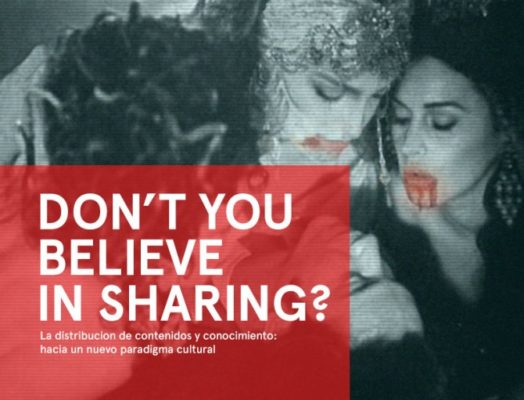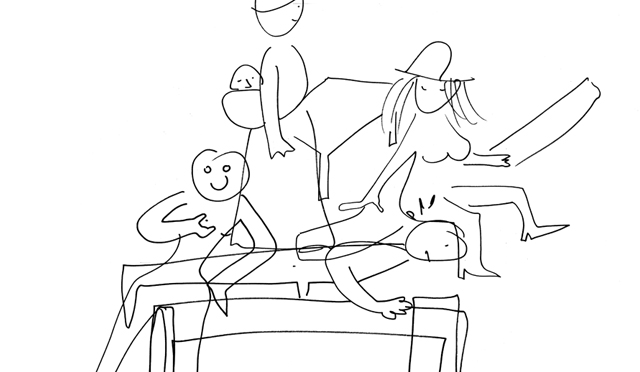Search
To search for an exact match, type the word or phrase you want in quotation marks.
A*DESK has been offering since 2002 contents about criticism and contemporary art. A*DESK has become consolidated thanks to all those who have believed in the project, all those who have followed us, debating, participating and collaborating. Many people have collaborated with A*DESK, and continue to do so. Their efforts, knowledge and belief in the project are what make it grow internationally. At A*DESK we have also generated work for over one hundred professionals in culture, from small collaborations with reviews and classes, to more prolonged and intense collaborations.
At A*DESK we believe in the need for free and universal access to culture and knowledge. We want to carry on being independent, remaining open to more ideas and opinions. If you believe in A*DESK, we need your backing to be able to continue. You can now participate in the project by supporting it. You can choose how much you want to contribute to the project.
You can decide how much you want to bring to the project.

The distribution of contents and knowledge: towards a new cultural paradigm.
One of the most outstanding features of the last twenty-five years has been the surge of new technologies that have directly affected our lives, from the appearance of Internet and telephones (first mobile and then intelligent), to the first artificial heart and nanotechnology. Suddenly, scenes that reflected the everyday of the future in films such as “Blade Runner” or “2001: a Space Odyssey” have become a mirror of our everyday reality and some of the gadgets that appear in them, already even form part of our past.
Digital technology has changed the way we relate to each other, the way we look, the way we find things out, shop, write, read, think or simply the way we “are” (connected, obviously). We navigate, speed read, cut and paste, establish and follow hyperlinks, we get lost on the way but also discover “other paths”, relating ideas and concepts and shattering hierarchies. The artist pinpoints, commences, navigates, selects and rereads, incorporating quotations and references to generate new stories. Digital technology also modifies forms of production (the processes of investigation, management, publication), enabling greater autonomy (DIY has become the norm) and of course, this leads to changes in the way it is all communicated, distributed and consumed. It is harder to talk about fixed categories in relation to the visual arts, film, literature or music. They produce hybrids, no doubt because they share certain ways of doing things… They share!
Has sharing not been one of the ideals behind cultural practices? A belief marked by utopianism, generating knowledge amongst everybody. However, this sharing fomented by the new paradigm of open and global distribution that Internet implies seems to be leading cultural practices to a critical state. In effect, Internet is not a new format, nor a new language, in the way photography and film were, it is a new form of distribution. And this (already not so) new form of distribution seems to be what is provoking exacerbated crises in the cultural industries linked to publishing, music and film. Beyond this exacerbation we want to consider what this new paradigm means; how, as creators, we ought to operate, or what pathways it opens up (as it doesn´t just close them). However, just as the saying “if you want to make peace, prepare for war” implies, if this process of change regarding the distribution of contents seems to have affected film, music and publishing, how long will it take for it to hit art? How much longer can the unique copy resist? Or the editions of videos, of 1 to 3, 1 to 10, or 100, when we can watch them on video channels on the Internet? And share them and generate a new story with other videos and hypertexts… What role can the different individual agents and collectives, or art institutions, be they public or private, play?
At A*DESK we can´t provide answers but we can speculate or at least pose these questions. The impact of the digital on the conception, production, distribution and communication of culture is a subject that A*DESK has been concerned with since the beginning of the project, when all is said and done we were born on-line and we continue to offer free access to contents on-line. We have already approached the issue from different angles and in other formats and now we propose to do so in depth, in this first edition of the new format of the A*DESK Magazine.
In this edition of the magazine, Adrián Hiebra reflects on the distribution of contents inherent within the digital logic, by way of case studies that work with new media, spaces and tools; Eduardo Pérez Soler focuses on the Web as a hypermuseum and how it modifies relations between museums and users; Olav Fumarola Unsgaard looks at the future of the information media in the digital era; Jorge Carrión observes the hybridisation of literature with other disciplines and the implications of digitalizing literature and Raquel Herrera analyses the distribution of publications by and about artists in the digital context. To complete this edition three interviews; with Felipe González Gil, of Zemos98, an example of a management group and creative collective that works around the idea of free culture; with Antoni Abad, an artist who’s evolution has led him from sculpture to a dematerialized work that implicates people and the use of mobile data networks and with Mario García Torres, an artist who elaborates personal “stories” about the structures of art, using a wide variety of media and formats.

A*DESK is a critical platform focused on publishing, training, experimentation, communication and dissemination in relation to contemporary culture and art, which is defined by transversality. The starting point is contemporary art, because that is where we come from and this awareness allows us to go much further, to incorporate other disciplines and forms of thought in order debate issues that are relevant and urgent for understanding our present.
"A desk is a dangerous place from which to watch the world" (John Le Carré)